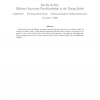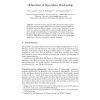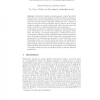106
click to vote
TCC
2010
Springer
14 years 12 months ago
2010
Springer
Abstract. We study the necessary and sufficient assumptions for universally composable (UC) computation, both in terms of setup and computational assumptions. We look at the common...
TCC
2010
Springer
14 years 12 months ago
2010
Springer
105
click to vote
TCC
2010
Springer
14 years 12 months ago
2010
Springer
Abstract. We present a general parallel-repetition theorem with an efficient reduction. As a corollary of this theorem we establish that parallel repetition reduces the soundness e...
118
click to vote
TCC
2010
Springer
14 years 12 months ago
2010
Springer
We revisit the composability of different forms of zero-knowledge proofs when the honest prover strategy is restricted to be polynomial time (given an appropriate auxiliary input)...
TCC
2010
Springer
14 years 12 months ago
2010
Springer
106
click to vote
TCC
2010
Springer
15 years 13 days ago
2010
Springer
Previous work on program obfuscation gives strong negative results for general-purpose obfuscators, and positive results for obfuscating simple functions such as equality testing (...
110
click to vote
TCC
2010
Springer
15 years 6 months ago
2010
Springer
Related-key attacks are attacks against constructions which use a secret key (such as a blockcipher) in which an attacker attempts to exploit known or chosen relationships among ke...
155
click to vote
TCC
2010
Springer
15 years 7 months ago
2010
Springer
We consider message authentication codes for streams where the key becomes known only at the end of the stream. This usually happens in key-exchange protocols like SSL and TLS wher...
117
Voted
TCC
2010
Springer
15 years 9 months ago
2010
Springer
Introduced by Micali, Rabin and Kilian (MRK), the basic primitive of zero-knowledge sets (ZKS) allows a prover to commit to a secret set S so as to be able to prove statements such...
TCC
2010
Springer
15 years 9 months ago
2010
Springer



